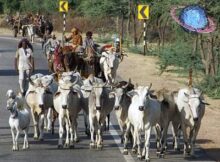Gor Banjara Folk Literature
The folk literature of Gor Banjara people is still preserved orally. I have written a separate book on Gor Culture. Here I am trying to present different references to the folk literature. The cultural history of any tribe is incomplete without the study of the concerned folk literature. Renowned poet Ravindranath also has supported this fact. Folk literature is the only media through which we can study the ancient civic life. The history and references of life are expressed in the folk literature of the concerned primitive tribe. Folk literature is the foundation of literary and social history.
The process of studying folk literature in the world started in 19th Century. In India it started after the entry of British into our country. Mary Fryer did collection of Bengali phrases and proverbs in 1858. This was followed by lot of writings on the folk literature of Indian Tribes. Still we have numerous ancient tribes and if their folk literature is studied in details then we may have to write the history of human life once again. Such is the importance of folk literature (Loksahitya, Ravindranath Tagore, Marathi Trn. By Durga Bhagwat, page 1 onwards). The folk literature of Gor Banjara can be divided as follows:
Folk Songs: Songs of rituals, festivals, women, children, religion, worship and devotion; folk stories, entertaining stories, story of demon and princess, stories on animals and songs expressing the story of King and Queen.
Folk Tales: Religion, history and mythology.
Legends: Local, public. [These legends are included in the book ‘Banjara Loksahitya Mein Samaj Aur Samskriti’ by Prof. Motiraj Rathod]
Songs of Rituals: Jalawa Dhoker, Nataro Geed, Wadai Geet, Gurumantra, Dhundh ritual song, Waya Nakata (cremation rituals) song.
Festival Songs: Teej, Dussehra, Diwali, Holi, Nari Song, Ghati Parer Geed.
Saki: Saamler and Olakher Saaki, Lokgatha – Eralu Kanhayi.
Kelawat:
The song of women (Nari Geet) is more important among the Gor Banjara folk songs. Whatever may be the ritual, Nari Geet are given prominence. On the occasion of Holi etc. worship or the religious songs are mainly male songs. The woman is depicted as a tender mind in the songs. “Folk literature is an impression of the tender and auspicious feelings of the women and of the children’s wild imaginations.” [Loksahitya, Durga Bhagwat, page 9). Dr. Manohar Sharma in his book ‘Loksahitya Ki Samskritik Parampara” explains the characteristics of folk literature: “Folk song is the song of the heart. It encompasses not only the feeling of a single person but of the whole community.” (Page 59).
References of Gor Banjara folk songs have been given earlier. Still I am giving here some folk songs, which express the community feeling. In the process I have tried to express the similarities and beauty of the Malawi and Nimadi folk songs. They also show the similarity between the lifestyle of Kshatriya Gorvamshiyas in Nimad and Malawa province. It will also substantiate the history of Gorvamshiyas.
The folk songs of Gor Banjara women can be broadly divided as follows:
1) Ghati Parer Geed
2) Nacher Geed
3) Balloachya Sawarer, Ramader Geed
Ghati Parer Geed
The songs on the occasion of festivals etc. rejuvenate the mind. In the same manner the variety of feelings like, sorrow, pain, hardships and deception are expressed in a song performed at the time of producing flour on stone-grinder and another sung at the time of meeting each other (Maler Song). The state of mind of a woman, who is going to her husband’s home, is expressed in the Ghati Parer song.
The folk songs performed while making flour on a stone grinder:
आद्लिक पिसु बाई पालीक पीसु ये… सासु मारी सदेती बोलेनी बाई ये… आळी आळी गराळों करछ बाई… उठ परभातीन पाणी भरन सडा सारण करु छु… सासुरे पेटम कपट बाई ये…. सासु मर जाणुं, ससरो मर जाणुं, देवरेन मसोबा खाजाणूं बाई ये….. नळंद मर जाणुं, जेठेन तो आसराई खा जाणुं बाई ये…. कलप कुंजी हात आवजाणुं बाई ये… [Courtesy: Mrs. Sakai Jadhav, Taroda]
Meaning: The thoughts in the mind of a woman who is harassed by her in-laws are expressed in this song. The woman, after her marriage is expected to face any kind of hardship by her parents at her in-laws. At the time of farewell in the marriage ceremony the girl promises to her parents that she will not let them down due to any difficult situation. The woman says in the song: I have made the flour, cleaned the house, coated it with cow dung, filled the drinking water, did lots of hard work. Still the mother-in-law is not happy (with me). She thinks ill of me. I am fed up and now think how to free myself from this situation. Though I work hard she defames me among the whole Tanda. Hence I am praying for the death of my family and mother-in-law. Masoba and Aasara should eat my brother-in-law and other elders. If all of them are dead I will be the sole owner of this house. Then both of us will live happily together.
The Curse of Poverty
An ordinary woman of the Tanda expresses about her poor life in this song:
हमारे तांडे में बाई जोगी आयोच ये… सेर पसो लावुचु, पिसन खाउँचु ये… जोगीर झोळीस काई घालु बाई ये… घरे आंग बाई तूळसी लगायी ये… रोज करू छु पुजा बाई ये…. हाटेनी गरीबी घरेरी बाई ये… आंगेळे म ऊभे देव धरम ये, हात जोडन विनंती करूछू ये…तरी हाटेनी गरीबी बाई ये… देव धरम लाचारी लेरे छ ये… कुण हटाय गरीबी बाई ये… ओ गरीबीन रंग चडे मंणेरो ये…;धोयती जायेनी बाई ये… चांदा सुरीयारी जोड तपच ये…;छेनी मारी जीवेरी आब बाई ये… आंगळेम उभो नायक नसाबी ये…;का सतवा लेरो छी बापू र हमारो ये! [Courtesy: Smt. Sakari (Phufi) Chavan, Dindala]
Meaning: A sage has arrived in our Tanda begging for alms. What should I offer him? I can bring only a handful of grain, grind them and eat it. I cannot give anything to him. I have planted Tulasi (a sacred bush) in the courtyard, I also worship the gods but all the gods have given up in front of the poverty. Who will remove my poverty? It has stuck up with me for life. However I may try I am not able to remove it from my house. I am suffering from the heat of poverty like the heat given out by the sun and the moon. What I should do now? The poverty will certainly finish me. I have no hope in my life. The Naik of the Tanda is standing in the courtyard. If he thinks it right then my poverty can be removed. The Naik is a just person but he is (also) testing us.
The song is highly emotional in nature. A needy person is standing in front my home, how should I follow my duty? This is the question posed by this song. It expresses a live experience about poverty. The gods have also given up in front of the poverty.
In another song a newly married woman has come to her husband’s house. She remembers her loving brother. He is also of marriage age. He is beautiful, naughty as well as simple. She fears that the young girls of the Tanda will catch him in their web of love. She sings this song while on the grinding stone.
“हाटेरो हाटीलो विरेणा हाट मत जो, ति वडतीयारी छोरी रो छेडा लागीये, क धको मारीये, हुसी विरेणा हाट मत जो, वडतीयारी छोरीर नजर लागीये, लोभी वीरा हाट मत जो” [Courtesy: Zimapri Kaki, Didanka]
Meaning: My dear brother, you are very assertive. Don’t go to the market because the girls from Tanda visit the market. The girls of Wadatiya (Jadhav) clan will tease you by pushing or touching their headgear. You are very simple and will fall for them. The girls are very mean. They will catch you in their web of love; therefore you should not go to the market. Don’t be adamant on going to the market.
The married woman praises the oxen given by her father as dowry. Both the woman and her sister-in-law (Nanand-Bhojai) sing this song while making flour.
“तेली रो बळद सन गारी ये,….. गळ घुघर माळा वीरा वाळी के;मारो नवसे रो डोळीया। घाल गेळम माळा ये….हेली करछ चाळा। विरा वाळी रो बळद तलगांण्या ये….वीराती खावच टाळा।” [Courtesy: Mrs. Yamuna Rathod, Hatgaon]
Meaning: A Gor Banjara woman loves the oxen very much. The father of the bride presents her 2 oxen at the time of marriage. They are her favourite. The oxen are decorated with garlands of small bells in Telangana province.
The woman (Bhabhi-Virawali) says in the song: They are my gifted ornaments (the oxen). Her sister-in-law replies: ‘You are showing off these ornaments of yours. My brother also has a balad (an ornament). Don’t keep my brother away. Let your oxen be with you.
A brother goes to the house of his sister who is living in poverty. This is a folk song from this area:
“खिलारी जोडी बाई, झुलेवाळो टांगा ये…., वीरा मारो पामळों आयोच बाई ये…..। भाईन देखन भेन कवाड लगायी ये…… वेजारीर ú घर जान बैठी बाई ये….. जारन बाई मारी भेनेन मेलद… झटकन कवाड वघाडी बाई ये…. फाटीसी सादरी बेसेन दिनी ये… फुटेसे लोटाम जळ दिनी बाई ये… देखन बाई री हालत ये.. वीरा रे आखिम पाळीं बाई ये… विरा हीरारी ईटी काढन दिनोä बाई ये…. विराúÉ न लेजान बनियान दिनी ये…. रोती रोती लाडू बळांई, बाई ये…..” [Courtesy: Mrs. Kalpana Rathod, Mrs. Swati Rathod, Mrs. Rajashri Rathod, Aurangabad]
Meaning: The brother has arrived as a guest with a beautiful and youthful pair of oxen to my house. There is nothing in the house. The sister is worried. She went to the neighbor’s house to ask for some things, and the brother called her. She opened the door and gave him a torn sheet to sit. And water to drink in a broken cup. Tears appeared in her brother’s eyes by seeing the sister’s situation. He gave his diamond ring as a gift to her. She went to the shopkeeper, gave the ring and brought the goods. She prepared sweet laddoos and gave them to the brother. Now tears roll down her eyes.
“बापुन के वीरा कुवलो खदाद, मयी भरीवं मारी कुवले को ढंडो पाणी लाडी भोजाई भरीय, वीरा कुवलो खदाद, बापुन के वीरा…. भोजाई भरीय, मारी सातळं भरीय-वीरा कुवलो खदाद” [Courtesy: Mrs. Kamal Rathod, Gaul]
Meaning: The sister is requesting the brother that the sister-in-law (Bhabhi) needs to go far to fetch the water. You talk with Bapu (father) and get a well dug near the house. My Bhabhi will then fetch the water of the well. I will also accompany her. My friends also will get the cool water of the well. Please you speak to Bapu and dug the well.
The song while operating the grinding stone is sung in a special style. I have recorded this tune. It is likely that the tune will be lost in the changing times. I can sing tunes of all songs e.g. Teej Song, Seasons’ (Ritu) song etc.
The Gor Banjara are basically siblings of mother Nature. Their entire life is associated with the environment. The tradition of Teej, Gangaur festivals are from Nimad-Malawa region. They basically belong to this region. The effect of this region and rituals is seen on this tribe. The Teej is celebrated when the earth is rejuvenated with greenery. The girls and boys pose quizzes to each other. And they are solved.
One Malawi Quiz:
कच्ची केरी कच्ची पक्की, पाकन दे दिनचार* काची मत तोड जो, म्हारो जीबन अकारण जाय।
Gor Quiz
काचो हुल्डा कच काचीयायेä, नख लागे जीव जाये। घर दनी न खादो परदेशी कैसे खाव।
Malawi Quiz
आटी डोरा कांगसी सीस गुंथाये जाय। सामे मिल गया, सायबा छाती धडक जाय।
Gor Quiz
हास बांधु हासली खेचन बांधु आटी।
The groups of women and girls are always ready with beautiful attire and ornaments during the Teej festival. The woman who remains shabby in this period is not worth taking a look at. Other women do not participate her in song and dance. Then the woman puts on all ornaments and gets ready for the dance. She requests the women to let her in their group. Let me play with you. She expresses her feeling in this song:
“बला बला कोचो बाई, बला केती वेगी ये… मन आयेदो झुलरेमा ये… नाकेम भुरीया न भुरीयान साकळी मन.. गळेम हासली न हासलीन तितरी मन… बला बला… हातेम, चुडीयान, चुडीयान बोदलु मन.. बला बला… कडेन घाघरो न घाघरेन डोरी मन.. बला… मातेय लोवडी न लोवडीन घुंघटो मन…बला….” [Courtesy: Recording – Wali Yadi).
Meaning: Don’t abuse me, see I am also ready and looking beautiful. Take me in your group. I have put on a beautiful ring in my nose. I have a Hasali (necklace) and beautiful Titari around the neck, bangles in my hand and Bodul on the collar. My ghaghra is huge and is connected with a string. Don’t call me names unnecessarily. Please allow me in your group for dancing and singing.









